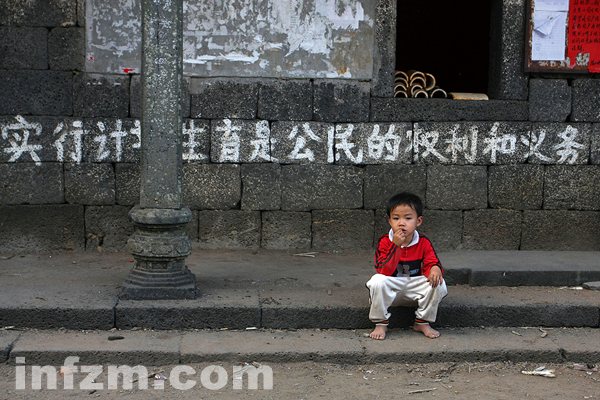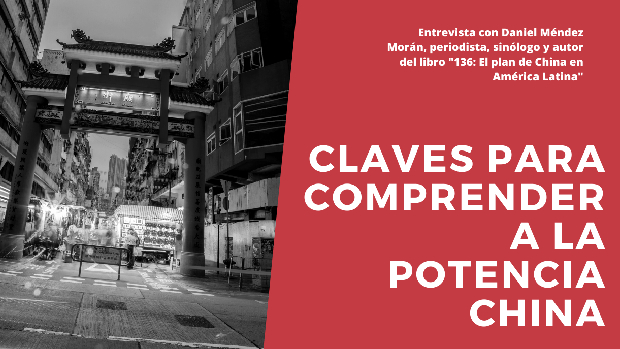More than thirty years after the introduction of the one-child policy, this is the question asked today by Nanfang Zhoumo , one of the best and most daring publications in China. In full color and on the cover, the weekly highlights that “30 years ago, when the population was growing and the one-child policy was implemented, the Central Committee of the Communist Party itself assured that in 30 years this policy could change.” “More than three decades have passed and Chinese society is on the verge of aging,” says the newspaper, which spoke with the country’s main officials and analyzed in detail the circumstances in which the one-child policy finds itself today.
“Complying with the one-child policy is a right and an obligation of citizens”
According to the weekly, more and more personalities are favorable to change. Among them is Zhang Yin , one of the richest women in China, who during the recent National Assembly ( lianghui ) made a proposal: to start little by little to allow couples to have two children, within three to five years , launch the measure nationwide.Zhang Yin acknowledged that “during the National People’s Congress there were many other people who made proposals to reform the birth policy. I did it with the idea of being able to support the elderly, ”says Zhang, a member of the Consultative Conference. “The birth rates right now are very low, if we continue like this we are going to enter an aging society to which we will not know how to respond.”
The report perfectly shows that times are changing and that China seems to be entering another phase in its history. Nobody like Yi Fuxian (易 富 贤) to show the changes that have taken place at the top of the Chinese Communist Party. This well-known academic, who has lived in the United States since 2008, has been defending the relaxation of the one-child policy for years. Long ago, when he published his research and theories on a website, they “mysteriously disappeared.” Shortly after, he published a book called “The Great Country Runs Out of People” (大 国 空 巢), where he explained the need to change the country’s demographic policies. At the time, the book was immediately banned in China.
But, according to Yi Fuxian, a radical change occurred in mid-2008 . In June of that year, the foreign edition of the People’s Daily published one of its articles. In it Yi Fuxian did not speak directly about China, but its publication meant that it was no longer banned from the Chinese media. The debate over reforming the one-child policy was beginning to open up.
Shortly after, other media (the Phoenix television network, Caijing, etc.) began to interview him. At the same time, Peking University, Tsinghua University, and the National Library accepted his book, which even became mandatory study material at East China Normal University . “All of these things were totally impossible before,” says Yi, who thinks the one-child policy is nearing its end and that current social conditions make its survival unviable.
As always in China, the change in the government’s position has been gradual and contradictory. On January 24, 2010, the head of the one-child policy in Beijing, Peng Yuhua (彭 域 华) stated that “the conditions for adopting a policy favorable to having two children are encouraging. In four years it could happen in Beijing ”. On February 28, the Reuters agency quoted the words of the national director of family planning, Zhao Baige (赵 白鸽), who responded in this way to the possible reform of the one-child policy: “I cannot answer you when it will be decided, but Yes, I can tell you that this topic has become one of the most important and at the highest level ”. They both qualified their statements later, but it was clear that things were moving inZhongnanhai , the center of power in China.
Another piece of evidence that places the one-child policy at the center of the political debate is the top-ranking position held by Li Keqiang (Vice President of the country and one of the main candidates for Prime Minister in 2012) at the Research Center of Demography. Li has stressed that “population control” has to become “population development.”
“All these factors have given the population a lot to think about,” explains Nanfang Zhoumo . “Is the one-child policy really going to change?” He wonders.
Yi Fuxian thinks that the reform of the one-child policy may come between 2010 and 2011, when the twelfth Five-Year plan (2011-2015) is debated. In 2011 the final census data will be known, and then “China will inevitably have to make major changes in the one-child policy.”
Yi uses Japan’s failures as an example that China should not follow: “There are people who say that Japan’s slow economic growth is due to trade, technological capacity, etc … 90 began the aging process of its population ”. Many other experts say that, if demographic policies are not changed, China will face a huge economic challenge in 30 years.
The last three decades have also brought about a major mindset shift in Chinese society. Right now there are few people who think that “the more children the happier,” says Yi Fuxian. According to studies by various demographers, the total aspirations of the Chinese would be around 1.8 children per mother.
Important changes have also occurred among the country’s leading demographic experts in recent years. At the end of 2009, the director general of the research center of the Chinese Academy of Social Sciences , Hu Angang (胡鞍钢), and the former director of the Demographic Research Center of the same Academy, Tian Xueyuan (田 雪原), They published an article in which they advocated reviewing the country’s demographic policies. His stance was especially significant because until then they had both been ardent advocates of the one-child policy.
Earlier, in 2008, Hu Angang stated that “the current one-child policy has an expiration date and will not be able to continue like this for another ten years . ” In the interview with Nanfang Zhoumo , Hu explains that his change of position is due to the fact that “the previous policy was effective when China was a low-income country, but today China has already become a middle-income country. The demographic context has changed, the Chinese development process has changed ”. In the 21st century, China faces the challenge of “an acceleration of its low birth rate and its aging”.
Tian Xueyuan also stated in December 2009, in an article published in the People’s Daily , that during the next Five-Year Plan (2011-2015) “population policies should be reformed and adapted to modern times.” Tian said that “the country is not divided into country and city”, and that if couples could already have two children in the country, it was desirable that at the beginning of the next five-year plan urbanites could also have them.
In 2005, the birth rate in China was 1.33 children per mother. It is estimated that by 2030 there will be a population of 355 million Chinese over 60 years old.“The survival rate of a population is 2.0 children per mother. A higher percentage would mean growth, a lower percentage would mean growth. That is why the policy of two children should be implemented ”, defends Gu Baochang (顾宝昌), another of the interviewed experts. “No matter the influence that the one-child policy has on the birth rate, what is certain is that it accelerates the aging of the country and is one of the reasons for the imbalance between the sexes – in relation to the increasing number of men and the lack of of women- ”, says He Yafu (何亚福), another academic. According to He, the first half of the 21st century in China would be divided into two phases: in the first 20 years the pressure to find work would be very strong; in the next 30 the burden of supporting the elderly would be too heavy.
Although Nanfang Zhoumo indicates that among experts there is a significant majority who defend the reform of the one-child policy, there is also space in the report for those who advocate maintaining the guo status . Among them is Hou Dongmin (侯东民), who considers it unsustainable to change the current demographic policy of the country: “China’s population is very large in itself, if we implement the policy of two children, the resources and the environment will not be able to support it. For example, we are a country that consumes a lot of steel and we depend on foreign countries to get it 50%; in cotton per capitaWe only have 6 or 7 meters … They say that the one-child policy must be reformed to prevent the aging of the population, but they have not thought about factors such as the economy, the environment or natural resources ”. This expert gives Western Europe as an example, where the aging of the population began in the 90s and still has not had a labor shortage, with unemployment stable at 8% -10% since then. This researcher advocates improving the State protection system to solve the aging of the population.
Among the experts who oppose any change (what they call the conservative wing) is Ma Li, a member of the State Council: “the conditions today are not yet ripe to universally implement the policy of two children . “
What does seem to be clear is that in the coming years the two factions (for and against the reform of the one-child policy) will fight a battle. “In the previous five-year plan they [the anti-reform conservatives] won; we lost. Now we have to fight in the twelfth five-year plan, ”says He Yafu. Even conservatives seem to acknowledge that things have changed: “Right now, most demographers, like Tian Xueyuan, Cai Fang (蔡 肪), etc… defend the policy of two children. Only a small group of academics, like myself or Li Xiaoping, can barely contain them, ”Hou Dongmin acknowledged.
Despite these opinions and this confrontation behind the scenes, the Government is not interested in the debate being too public. An expert on demographic issues from the Committee (which the weekly keeps anonymous), affirms that “the stability of the policies is very important. People are afraid of causing a stir, so these policies cannot be discussed publicly, it can only be done through scientific research ”.
The Nanfang Zhoumo ends his article talking about the critical situation facing cities like Shanghai, where the number of children per mother is from 0.7 to 0.8. He also cites the current model structure, 4-2-1, in which two only children have to care for four older people and one child.
In the last paragraph of the report, the weekly talks about the inequalities caused by the current situation. What the one-child policy actually does is give you a fine if you have more than one child (very high and that vary depending on your salary), so that those with more economic resources do not have too much difficulty having the children they wish. “Today, the famous and rich are seen everywhere, and those who have power cause obvious inequalities when having children. “It is the experts and society who have to resolve this conflict,” concludes Nanfang Zhoumo , who today has broken a spear in favor of openly discussing the reform of the one-child policy.
Sources
► Nanfang Zhoumo:二 胎 政策 : 历史 关口 , 正在 辩(in Chinese)
More
► Danwei: Rich people should be fine more
► Global Voices Online: The one-child policy about to be revised










En primer lugar felicidades a Zaichina por la apertura de este espacio, me parece una excelente y necesaria iniciativa. La seguiré con atención!
En segundo lugar y comentando la notícia, no se si sería una buena idea eso de levantar la política del hijo único ya que podría ocasionar más problemas de los que solucionaría. Actualmente el cumplimiento de la política ya es bastante laxo, probablemente por eso la población china sigue creciendo (aunque lentamente) año tras año. Levantar la veda podría ocasionar una grave crisis demogràfica en un país con una relación tan crítica entre población y recursos propios. El envejecimiento es un mal menor, y puede ser paliado con la reforma sanitaria.
Hola! Que bueno traducciones en espanol, enhorabuena y buena suerte!
En cuanto a la politica del hijo unico, poco a poco ya la estan cambiando. De todas maneras es un poco cachiondeo, yo conozco a bastante gente con 2 hijos, y eso que vivo en Shanghai. Mis vecinos son de la minoria Hui y les acaba de nacer la sexta hija, pero pasan de todo pq a los Hui no les suelen molestar, y ademas de todas maneras ellos llevan sin pagar impuestos toda la vida…
Personalmente, siempre he pesnado que la politica del hijo unico es uno de los mayores exitos de China, que muchos paises deberian aprender. Poco a poco la iran quitando segun vean que ya no es necesaria, pero creo que aun es pronto para eliminarla del todo. De todas maneras, para la mayoria de la gente no es un trauma hoy en dia que yo sepa (supongo que al principio hace 30 anyos seria mas duro hacerse a la idea)
Bruce Humes (bruce-humes.com) habla del último libro de Mo Yan (莫言), uno de los escritores más leídos de China. Rana (蛙) trata precisamente del tema del único hijo. "Rana recorre la vida de una partera testigo de obligados abortos tardíos, esterilización forzada y otros horrores, y lo hace en forma de cuatro letras y una obra de teatro." Otra visión sobre el tema. por ahora sólo en chino.
No es por polemizar, pero de la misma manera puedo recomendarte un monton de libros sobre Africa donde los ninyos se mueren a patadas, y una de las razones es que las familias se reproducen sin ningun control. No apoyo el aborto, pero considero que los desastres causados por la falta de planificacion familiar en paises en desarrollo son aun mucho peores.
Por otra parte, mi hermana es medico en un hospital espanyol y me cuenta barbaridades de alli. Hablamos mucho de los Chinos, pero en Europa las mujeres abortan una barbaridad. Las proporcion de mujeres que han abortado una o varias veces es importante.
En mi opinión, ni China ni el mundo están listos para la abolición de esta política, especialmente por la (ya mencionada) falta de recursos para mantener a un mundo que ya está superpoblado e inmerso en la insostenibilidad. Es verdad que choca, pero creo que ha sido uno de los aciertos políticos de China. También es verdad que habrá una generación 4-2-1, pero parece que los que quieren cambiar la medida no han reparado que, de seguir creciendo, no habrá una generación presente esforzada, pero sí muchas futuras generaciones inmersas en crisis medioambientales, de recursos y económicas.
Además, hay que tener en cuenta que aunque las cifras estimen 1,3 hijos por mujer, en realidad la cifra es más alta: supongo que se habrán incluido los "hijos extra" que les está permitido tener a las familias compuestas por minorías étnicas, o el segundo hijo que se les permite tener a algunos campesinos en caso de que el primero sea una niña, por ejemplo, pero en la realidad hay miles de niños que no están inscritos en el censo. Una parte son niñas a las que se da a luz a escondidas y no se inscribe, para poder "volver a probar suerte" e inscribir así al posible hijo varón; parte de esas niñas son abandonadas o vendidas a redes de mafias; otros son hijos de padres que no están casados, y por lo tanto no tienen derecho a constar en el censo (en China, esto es así). Todos estos niños carecen de hukou y de cualquier derecho a sanidad, educación, etc., y suelen vivir en el campo.
Las desigualdades de que muchos se quejan señalando que hay quien puede permitirse pagar multas por segundos hijos, yo no las encuentro tan escandalosas: después de todo, ¿qué sentido tiene tener muchos hijos (mentalidad en especial de los campesinos, que son más pobres) si luego no tienes para mantenerlos y pagarles estudios…?
La tragedia de los abortos tardíos, las desigualdades de sexo, y los problemas de dependencia de los hijos a la edad adulta se podrían mejorar al menos con unas cuantas medidas, y algunas son muy fáciles:
1. Educación sexual en la escuela. Parece mentira que en un país que lleva implantando medidas de planificación similar tan importantes y estrictas, nadie les explique a los adolescentes la cuestión de la semillita. No se ve ni publicidad de métodos anticonceptivos por ningún sitio, y ni siquiera los padres lo suelen explicar, por vergüenza. La desinformación es tal, que ni siquiera hay tampones a la venta porque se cree que desvirgan a la mujer y que "es cosa de guarras". Y ya son varios los casos que he conocido de chicas jóvenes que se quedan embarazadas en un descuido y han abortado a escondidas, otras dos que consideraron el suicidio y, en un caso, una que se suicidó.
2. Legalizar la situación de los hijos nacidos de padres no casados.
3. Promover la adopción.
4. Sensibilizar a la población del cambio cultural ya existente, que hace que tener un hijo o una hija no suponga diferencias como tener garantizado que alguien cuide a la pareja de mayor (en el primer caso) o tengan que quedarse solos y sin recursos económicos (en el segundo).
5. Apoyar medidas y derechos que promuevan y defiendan la igualdad y la protección de la mujer.
6. Aprobar el aborto en etapas iniciales.
7. …llegado el momento en que sea viable, implantar un sistema de seguridad social y ayudas económicas a personas mayores. Sé que hablando de un país en vías de desarrollo suena a ciencia ficción, pero, ¿no es ciencia ficción lo que se destina a la milicia…? Además, si se supone que al país le queda algo de "comunista", sería de las primeras cosas que tendría que mirarse.
No soy ninguna experta en estas materias, pero me parece que no digo ninguna barbaridad, aunque habrá un par de puntos en que muchos discrepen de mi opinión. Más barbaridad me parece grabarle un impuesto a las mujeres que se quieran casar con extranjeros, como si fueran una mercancía.